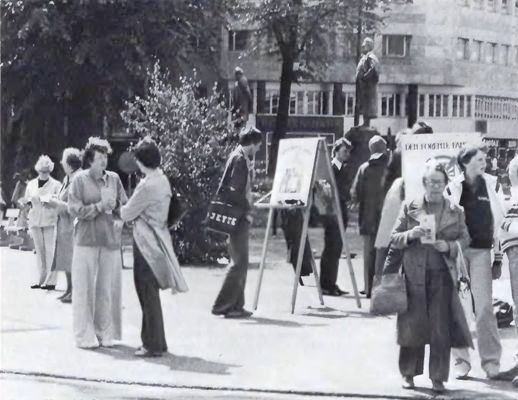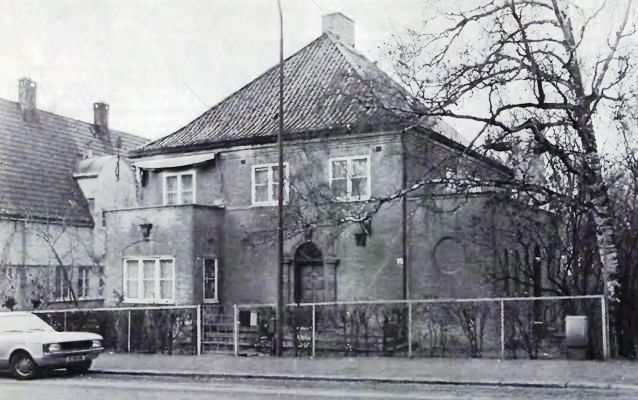![]()
The Words of the Monnesland Family
|
|
The Words of the Monnesland Family |

Norway was Christianized more than 1.000 years ago by Vikings who met Christianity in England. Since that time there has been a strong foundation, and today Christianity is very much alive. There is a high percentage who devote their lives to foreign missions, and this tradition is very strong. There are many revival groups. We would say that this is a very conservative foundation, but some would call it "narrow-minded" because the traditional foundations of Christianity in Norway have never been challenged by any other religious ideas.
About 95% of the people belong to the state religion, so explaining Divine Principle along the lines of Lutheran theology is the main part of our work. We have established good contacts within their Church structure.
Law requires all members of the state church to educate their children within the religion, so schools all teach Lutheranism, but religious education is much broader now, especially at the high school level. Now, even by law, all religions must be taught. This means that we, too, as a religious organization, have a chance to teach in the schools. The students at the Teachers' Colleges are very interested in what we teach.
Teachers actually have a responsibility to teach about Unification Church because we are now in the textbooks as a religion, therefore, they should devote a little time to us. We are in the section along with Bahai`s, Mormons, Jehovah's Witnesses, and many others.
In New Religions class, we have many times been invited by the teacher and students to come and speak. We give an outline of Divine Principle, especially the new aspects, and the lifestyle in relation to Lutheranism. There are always many questions afterwards.
Even with laws supporting Lutheran faith as the predominant one, religious freedom is still absolute, so the government does nothing to interfere with our work. This makes it easy for our work to progress on this level of public relations.
Norway is a country of 4 million people, a rather small population widely scattered over a large nation. At the grassroots level with home church, fundraising, and street-witnessing activities, we face a special kind of challenge: In wintertime the northern part of the country is almost completely cut off by ice and snow storms, and with the high mountains and deep valleys, it is sometimes very difficult even to have communication all year round. Most of our activities must take place in summer- time. Fundraising and other team activities are not the way to bring success in the wintertime.
We concentrate our activities in the four large cities; Oslo, the capital, Bergen, Trondheim, and Stavanger. We witness on streets and at the universities. This past two years we have begun home church activities. When Rev. Ken Sudo was here in Norway, he said it was an ideal country for home church, because in wintertime the nights are so long that people just don't know what to do. So when we come, we can show them our slides and films, and teach them about the Principle. Climactic conditions are quite tough actually, so the peoples' lives take place very much in the home. There is not so much outdoor life, or life on the streets, as you see in more tropical countries.
Each member has an area, and because the streets are already clean, our activities are more like taking care of old people, cleaning inside the homes, and shoveling snow. Our work centers on building friendship and trust.
The Norwegian family in Oslo has a home church center, where home church evening activities are carried out; dinners are given, with entertainment. Especially popular are International evenings, which are special efforts to connect the hearts of the guests to the world. Often we show a film about another country.

Headquarters
of the Unification Church in Oslo. This house was the former Austrian
embassy in Norway.
Fundraising activities means we sell homemade candles and post cards, and our magazine. We publish a bi-monthly inspirational magazine called Im Morgen, similar in content to the London family's New Tomorrow. In the peaks of summertime fundraising activity, we are printing up to 15,000 copies and they sell well. We have our own printing equipment and do most everything ourselves.
Out in the country, in a very small town, our family owns a small hotel. It operates as a regular hotel, except for the times we use it as a training center. Our family just signs up all the reservations for ourselves, and tells outside customers that the hotel is full that weekend.
One activity we've been doing for several years is fishing. Our boat is capable of ocean fishing, both with nets and reels. Norway is blessed with cold and warm oceans crossing off the coast, and here is where rich fishing areas lie. Cod, herring, and mackerel are caught in nets. Some fishing finishes in May, while other kinds are caught all year round.
We fundraise as a charitable organization, which is different than a legally organized church. In a sense, there is total organizational freedom (anybody can begin an organization) so no registration with the government is required. When the time comes that we want the right to perform marriages, or provide ordination, or baptisms, then we must register as a church. Official registration, it seems, will mostly cause inconvenience to us now.
Most negativity toward the Unification Church comes from the foreign press; from the United States, England, France, and Germany. Therefore, our public relations means that we have to answer for others, rather than to answer for our own actions. Newspapers in Norway very easily pick up on what the Unification Church is doing elsewhere, even in Japan. We are well known, so even small news items are publicized widely.
The people don't really believe the most flagrant attacks against our church. At least, they don't believe that evil activities are going on in Norway. It is such a small country that it is not possible to do outrageous things without being stopped in some way. Even in the major cities there is a feeling of community, and a feeling that everyone knows everyone else, somehow. The country is like a big village. The reason this is true is because Norway is a very homogeneous country.
There are very few foreigners, actually. People are very suspicious of them, and everything from other countries is regarded with utmost skepticism. Norwegians are very curious about foreigners, too, but there is an immigration blockage and there is no permanent immigration allowed into Norway; only by marriage. Right now we are almost completely a Norwegian movement with Norwegian leaders, which is different from the situation in some countries.
Norwegians display a very masculine, adventurous national character, very stable and very determined. This shows up, for example, in the very high percentage of young Christian youths who devote their lives to foreign mission work. God will be able to use many young people from Norway to help in other countries. There seems to be much restoration which needs to take place among Scandinavian countries, especially since Norway was dominated by Danish and later Swedish rulers for periods of her history.
Already many Norwegians have taken missions in Germany, England and USA. A Norwegian brother was once sent as the leader of Sweden, and another sister was the first pioneer to go to Iceland. Norway's role seems to be her willingness and ability to make an offering of her best members, time and time again for Father's work in other parts of the world.